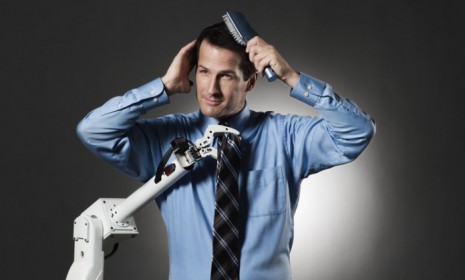TIME's report on our robotic future: 5 incredible predictions
Our species may become obsolete by 2045, says the magazine ominously, overtaken by artificial intelligence

A free daily email with the biggest news stories of the day – and the best features from TheWeek.com
You are now subscribed
Your newsletter sign-up was successful
The Singularity is coming. That's the belief of Raymond Kurzweil, a futurist and engineer profiled by Lev Grossman in this week's TIME magazine. Kurzweil's particular focus is predicting the point — known as the Singularity — at which the progress of machines will supersede that of humans. After decades of research, Kurzweil thinks he's finally put a date on it. Here, the five most extreme predictions highlighted in TIME's profile:
1. Computers will think like humans do by the end of the 2020s
The way Kurzweil sees it, technological progress will balloon in the 2020s. By midway through that decade, we will be able to reverse-engineer the human brain — that is, figure out exactly how it works. By the end of the 2020s, "computers will be capable of human-level intelligence." That means they'll be able to emulate "whatever it is our brains are doing when they create consciousness."
The Week
Escape your echo chamber. Get the facts behind the news, plus analysis from multiple perspectives.

Sign up for The Week's Free Newsletters
From our morning news briefing to a weekly Good News Newsletter, get the best of The Week delivered directly to your inbox.
From our morning news briefing to a weekly Good News Newsletter, get the best of The Week delivered directly to your inbox.
2. The Singularity will occur in 2045
In that year, artificial intelligence will be so dominant and abundant that people will either merge with machines to "become super-intelligent cyborgs," or we'll "scan our consciousnesses into computers and live inside them as software, forever, virtually." Another option: The robots will turn on us, in a Terminator-style twist.
3. After the Singularity, humans will become "functionally immortal"...
"Singularitarians" like Kurzweil believe that human beings alive in 2045 will "wind up being functionally immortal." Not just because we'll be able to transfer our minds into computers or robots, but also because the rise of "regenerative medicine" will repair the "damage" of old age. Fellow Singularitarian Dr. Aubrey de Grey describes it as a bit like preserving a "vintage car."
A free daily email with the biggest news stories of the day – and the best features from TheWeek.com
4. ... And we will be able to bring the dead back to life
Kurzweil envisages a world in which biotechnology and nanotechnology are so advanced that the human genome "becomes just so much code to be bug-tested and optimized." Extending your life infinitely becomes reality, as does resurrecting failed organic material. "Death loses its sting once and for all. Kurzweil hopes to bring his dead father back to life."
5. Oh, and human intelligence will conquer the universe
Once humanity has melded with machine, says Kurzweil, we will "light out for the edges of space as intergalactic godlings." The rate of our scientific advances will become so rapid that "within a matter of centuries, human intelligence will have re-engineered and saturated all the matter in the universe." And with that, we will have cracked the meaning of life.
-
 What to know before filing your own taxes for the first time
What to know before filing your own taxes for the first timethe explainer Tackle this financial milestone with confidence
-
 The biggest box office flops of the 21st century
The biggest box office flops of the 21st centuryin depth Unnecessary remakes and turgid, expensive CGI-fests highlight this list of these most notorious box-office losers
-
 What are the best investments for beginners?
What are the best investments for beginners?The Explainer Stocks and ETFs and bonds, oh my